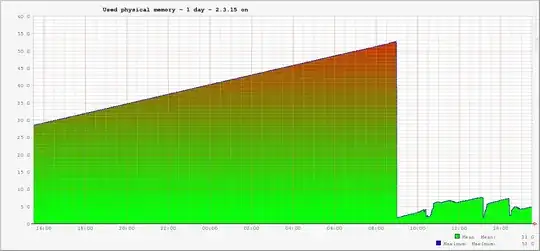Let me start with picture:

This is memory usage of our backup Tomcat server. It is just hanging there, processing simple healt check request every couple fo seonds and waiting for main server's crash to take the load. And it still has this growing memory usage. The main server has the same growing memory. And sooner or later, Nagios starts spamming SMSes and emails about memory and swap use.
Both servers are running CentOS 7, kernel 3.10, Java 1.7 and Tomcat 7.
Even when I stop the Tomcat server using systemctl stop tomcat, the memory still stays used.
Only way I found to free the memory is sync && echo 3 > /proc/sys/vm/drop_caches. So, the workaround is to put this in cronjob. But I'd like to found a proper solution.
I found this thread about similar problem, and it mentions setting MALLOC_ARENA_MAX to 4 (and some other threads advice to just 1) and I also found a thread saying it should work with MALLOC_CHECK_ environment variable. But it does not. That's what you can see at the right part of the chart.
If I look ad Used memory, it stays around 600 MB and Used non-heap memory is at 70 MB.
Do you have any idea what might be causing this and how to fix this? And I repeat, the memory is not freed after Tomcat is stopped, so I don't believe it's leak in our app.
# free -m
total used free shared buffers cached
Mem: 64268 4960 59307 64 0 135
-/+ buffers/cache: 4824 59443
Swap: 2047 0 2047
# ps -eo rss | awk '{sum += $1}; END {print sum/1024/1024}'
2.54199
Update from this morning, 9 hours after cronjob freed the memory:
# free -h
total used free shared buffers cached
Mem: 62G 13G 48G 80M 0B 77M
-/+ buffers/cache: 13G 48G
Swap: 2,0G 4K 2,0G
# ps -eo vsize | awk '{sum += $1}; END {print sum/1024/1024}'
25.8389
# ps -eo rss | awk '{sum += $1}; END {print sum/1024/1024}'
1.24232
# ps -eo pmem,rss,vsize,args | grep tomcat
1.7 1158608 22684408 java -classpath /usr/share/tomcat/bin/bootstrap.jar:/usr/share/tomcat/bin/tomcat-juli.jar:/usr/share/java/commons-daemon.jar -Dcatalina.base=/usr/share/tomcat -Dcatalina.home=/usr/share/tomcat -Djava.endorsed.dirs= -Djava.io.tmpdir=/var/cache/tomcat/temp -Djava.util.logging.config.file=/usr/share/tomcat/conf/logging.properties -Djava.util.logging.manager=org.apache.juli.ClassLoaderLogManager org.apache.catalina.startup.Bootstrap start
This is getting really weird. There is running keepalived which keeps sending HTTP request to health check function of our app via curl every few seconds. If I stop the keepalived, the memory stops growing. If I send the same curl request in infinite loop from bash on the same machine, the memory starts growing again. Even if I send the request to URL returning 404. If I start the same loop on different machine (so not from localhost), the memory is ok.
# slabtop -o
Active / Total Objects (% used) : 244359165 / 244369016 (100,0%)
Active / Total Slabs (% used) : 5810996 / 5810996 (100,0%)
Active / Total Caches (% used) : 70 / 99 (70,7%)
Active / Total Size (% used) : 45770306,72K / 45772288,52K (100,0%)
Minimum / Average / Maximum Object : 0,01K / 0,19K / 8,00K
OBJS ACTIVE USE OBJ SIZE SLABS OBJ/SLAB CACHE SIZE NAME
243660018 243660018 11% 0,19K 5801429 42 46411432K dentry
143872 141868 98% 0,03K 1124 128 4496K kmalloc-32
118150 118150 100% 0,02K 695 170 2780K fsnotify_event_holder
87040 87040 100% 0,01K 170 512 680K kmalloc-8
80448 79173 98% 0,06K 1257 64 5028K kmalloc-64
56832 56832 100% 0,02K 222 256 888K kmalloc-16
31926 31926 100% 0,08K 626 51 2504K selinux_inode_security
31140 31140 100% 0,11K 865 36 3460K sysfs_dir_cache
15795 14253 90% 0,10K 405 39 1620K buffer_head
15008 14878 99% 1,00K 469 32 15008K xfs_inode
14616 13365 91% 0,19K 348 42 2784K kmalloc-192
11961 11714 97% 0,58K 443 27 7088K inode_cache
10048 9108 90% 0,06K 157 64 628K anon_vma
9664 9480 98% 0,12K 302 32 1208K kmalloc-128
9287 7954 85% 0,21K 251 37 2008K vm_area_struct
8624 8624 100% 0,07K 154 56 616K Acpi-ParseExt
7264 7063 97% 0,25K 227 32 1816K kmalloc-256
5908 5908 100% 0,57K 211 28 3376K radix_tree_node
5304 5304 100% 0,04K 52 102 208K Acpi-Namespace
4620 4620 100% 0,09K 110 42 440K kmalloc-96
3744 3586 95% 1,00K 117 32 3744K kmalloc-1024
3458 3458 100% 0,30K 133 26 1064K nf_conntrack_ffffffff819a29c0
3360 3067 91% 0,50K 105 32 1680K kmalloc-512
3108 3108 100% 0,38K 74 42 1184K blkdev_requests
2975 2975 100% 0,05K 35 85 140K shared_policy_node
2520 2368 93% 0,64K 105 24 1680K proc_inode_cache
1560 1560 100% 0,81K 40 39 1280K task_xstate
1300 1300 100% 0,15K 50 26 200K xfs_ili
1272 1272 100% 0,66K 53 24 848K shmem_inode_cache
1176 1176 100% 1,12K 42 28 1344K signal_cache
1024 1024 100% 2,00K 64 16 2048K kmalloc-2048
975 975 100% 0,62K 39 25 624K sock_inode_cache
900 900 100% 0,44K 25 36 400K scsi_cmd_cache
864 864 100% 0,25K 27 32 216K tw_sock_TCPv6
737 644 87% 2,84K 67 11 2144K task_struct
720 672 93% 2,00K 45 16 1440K TCPv6
704 704 100% 0,18K 16 44 128K xfs_log_ticket
665 665 100% 0,23K 19 35 152K cfq_queue
646 646 100% 0,94K 19 34 608K RAW
640 640 100% 0,39K 16 40 256K xfs_efd_item
624 624 100% 0,10K 16 39 64K blkdev_ioc
624 624 100% 0,20K 16 39 128K xfs_btree_cur
578 578 100% 0,12K 17 34 68K fsnotify_event
555 555 100% 2,06K 37 15 1184K sighand_cache
528 528 100% 0,48K 16 33 256K xfs_da_state
512 512 100% 0,06K 8 64 32K kmem_cache_node
512 512 100% 1,00K 16 32 512K UDP
465 465 100% 2,06K 31 15 992K idr_layer_cache
450 450 100% 0,62K 18 25 288K files_cache